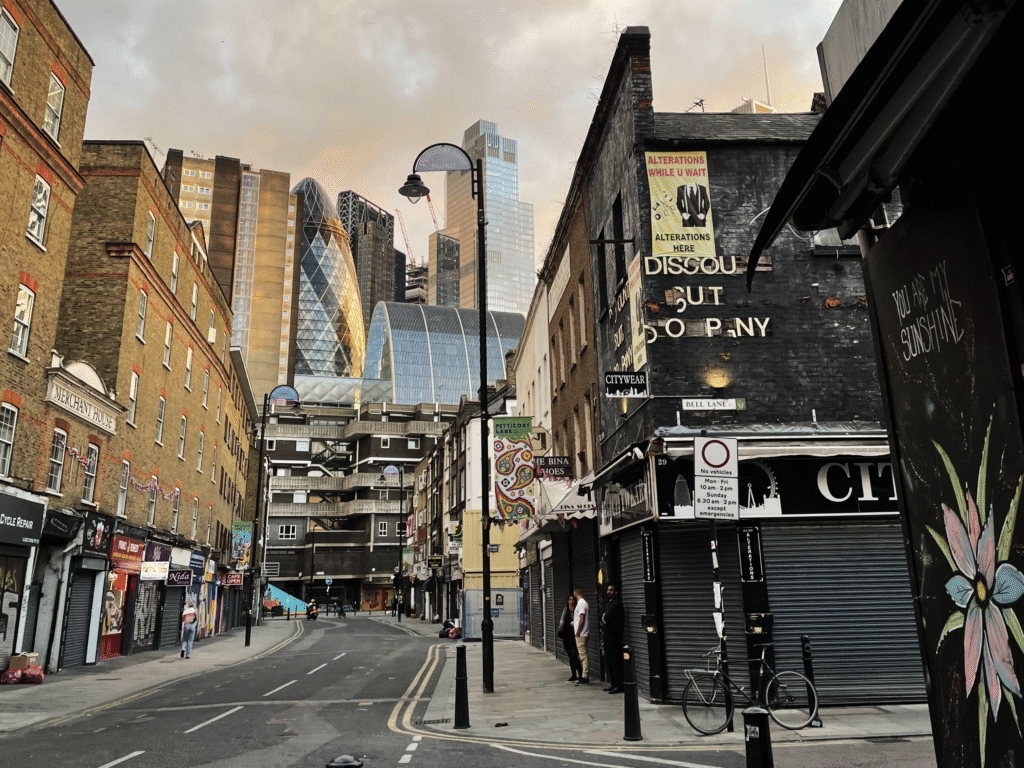The Thames looked like molten pewter this morning, reflecting the kind of grey January sky that makes you appreciate central heating and strong coffee. I’m writing this from a café in Bloomsbury, watching people hurry past in their wool coats and determined expressions, and feeling that peculiar mix of nostalgia and anticipation that comes with returning somewhere you once called home.
London in winter has its own austere beauty. The bare trees along the Embankment create intricate silhouettes against the pale sky, while the city’s ancient stones seem to absorb what little light filters through the clouds and reflect it back as something softer, more forgiving. Even the Tower of London looked almost romantic this afternoon, its medieval walls glowing amber in the brief afternoon sun.
What strikes me most is how familiar everything feels while simultaneously feeling completely new. I know these streets, recognize the rhythm of the Tube announcements, and can navigate from South Kensington to Shoreditch without consulting maps. But I’m experiencing it all through different eyes now — not as a student rushing between lectures, but as someone who chose to come back with stories to tell and plans to make.
The strangest adjustment has been linguistic. After months of thinking primarily in Russian, having English conversations swirl around me constantly feels both natural and oddly overwhelming. Yesterday at orientation, I caught myself mid-sentence switching between languages without realizing it. “So my background is в маркетинге — sorry, in marketing — though I also studied 中文 at Beijing University, which is where I really learned to think about cultural synthesis…”
My new classmates seemed charmed by this verbal code-switching rather than confused by it. One American student laughed and said, “You’re like a human Google Translate with a better fashion sense.” I’ll take it.
The Luxury Brand Management program starts properly next week, and I’m genuinely excited in a way I haven’t been about formal education in years. This isn’t just academic exercise — it’s strategic preparation for whatever comes after the book launch. Understanding the business side of creativity, the economics of aspiration, the psychology of desire.
My cohort is fascinatingly diverse: former Hermès executives, jewelry designers from Mumbai, tech entrepreneurs pivoting into fashion, art dealers expanding into digital spaces. Everyone has a story about how they ended up here, and I find myself taking mental notes for future characters. The Swiss woman who left private banking to launch sustainable jewelry. The Singaporean man who turned his grandmother’s fabric designs into a global lifestyle brand.
I’ve found a perfect studio space in Kensington — not far from where I used to live during my undergraduate years, but in a completely different headspace. The light is incredible, and there’s something deeply satisfying about setting up my nail station again, arranging bottles by color temperature, creating that small sanctuary where people feel safe enough to be vulnerable.
My first London clients are already booking appointments, word-of-mouth traveling faster than any marketing campaign could achieve. There’s comfort in the familiar ritual: consultation, preparation, the meditative process of creating something beautiful on someone else’s hands while they share pieces of their lives.
One unexpected joy has been rediscovering London’s art scene through adult eyes. The Tate Modern’s current exhibition on digital identity feels particularly relevant given my recent work. There’s something profound about standing in front of contemporary pieces that grapple with authenticity and representation while carrying a notebook full of stories about people performing their lives for invisible audiences.
The city’s cultural density still amazes me. Within a single afternoon, I can catch a film at the BFI, browse independent bookshops in Cecil Court, and attend a gallery opening in Mayfair. Each experience adds layers to whatever I’m working on, creating unexpected connections between disparate ideas.
My 2022 objectives feel both ambitious and achievable: excel in the MBA program, establish my London client base, and begin to work on my second novel.
The Thames keeps flowing, indifferent to human ambition, while I sit here making plans that feel both modest and revolutionary.
Posted from a city that remembers everything and forgives most things, where every street corner holds a story.
— Writer Julia Zolotova

